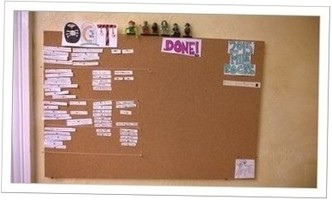Sprint 10: Polishing Manuscript in October
 October 18, 2015
by
David T. Allen
October 18, 2015
by
David T. Allen
September was a strange month. We finished the manuscript ahead of schedule, which disrupted our typical flow (but in a good way). In terms of process, we took a more Kanban approach instead of strictly planning full two week segments.
Pitch Wars
There was interest in our manuscript, but unfortunately, we were not selected. I do not regret entering the competition, though, because we heavily reworked sections that sounded good in theory, but didn’t work on paper, and ended up dropping over 10,000 words.
One mentor offered to help us with querying. Leslie and I are interested in traditional publishing, and we intend to begin seeking representation at the end of this year.
The Numbers
Milestones:
-
3 finished milestones
- Go to Another Con
- Book 2 Outline
- Improved Website
- 2 deprioritized milestones
- Book Cover for Echo Chamber Heist: we’re interested in traditional publishing, so this is less important.
- Dream Eater’s Carnival Audio Book: we’d rather write more at this time.
Tasks:
- 61 original tasks
- 64 finished tasks
- 16 finished scope creep tasks
- 13 unfinished original tasks
The tasks, specifically original versus scope creep, are inaccurate. Since we took a Kanban-esque approach, we didn’t always write new tasks on pink paper. I will try to correct this in October.
In terms of numbers, the goals and tasks weren’t completed as aggressively as in August, partly because we finished the manuscript early and talked for days about strategy and iterating on book two’s outline.
Unfortunately, I accidentally cleared the board before I took a picture.
Takeaways
-
Enter competitions. An external deadline forced us to refocus. Even though we weren’t selected, our manuscript had improved. Thinking of our manuscript as more of a finished product and less of a work-in-progress also cleared our minds so we could quickly make better decisions.
For instance, we could’ve spent weeks making our outlines for the Brunswick Academy and the Farm chapters work. An approaching deadline made us realize we were forcing it, so we scrapped those outlines and started over.
-
Maybe steady progress is bad. I believe it’s important to make progress every day. Small wins keep morale high, and not checking in every day makes it easier to abandon a project, especially when it gets difficult.
But planning the same type of tasks every two weeks can be monotonous. Monotony yields less productive work.
We hadn’t planned on entering pitch wars—we didn’t even know what it was until shortly before the submission date. Since Leslie and I are plotters, not pantsers, we might’ve wasted time preparing for the competition on ineffective things.
Forcing ourselves to be pantsers made us try new things.
-
Breaks are good. Things don’t get done when I relax, and that bugs me. I don’t think I could’ve taken a break if we just had steady progress. But August was so productive that taking a break wasn’t a problem. I’m avoiding the manuscript until Leslie finishes her revisions, just so everything is fresh the next time I read it.
-
People that like your genre can boost your confidence and help gauge if you’re writing to your target audience. But, their affinity for your genre may conceal problems in your book. This is why beta readers that dislike your genre are helpful.
Strategically making changes based on their input can improve the work for all readers. Don’t let their feedback discourage you, though—they aren’t your target audience.
-
Focus on the minimum viable product (MVP). There’s so much noise out there! There’s an abundance of articles with bad advice or no new information. Some articles are downright discouraging.
Disengage from demotivating, time wasting tasks, and focus on your minimum viable product.
- Drop unfinished tasks from the first half of the month into the second half. Previously we left unfinished tasks from weeks one and two in their rows, but pinned more in weeks three and four. We gauge how much can be done by how full a week’s to-do column is, so not bringing tasks down set us up for failure.
Advantages of Kanban
Kanban is a visual way to organize work, and can be as simple as post-it notes on a wall. You arrange tasks as to-do, in progress, and blocked. For now, Leslie and I just have to-do and done.
Kanban is used in a variety of companies. It started when Toyota in Japan researched supermarkets to improve their engineering process. Toyota used physical cards to improve team communication and understand, at a glance, what needed to be done and when.
With Kanban, you limit how many tasks are on the board so you can focus on the most important items. Too many tasks yield time sinks like reprioritization.
When Leslie and I began “sprints” in January, we tried to plan the entire month. Eventually we shifted to two-week planning sessions. In September, we reduced how much we pinned to the board to focus only on what we wanted to finish. Higher priority tasks will always appear unexpectedly, so it’s nice to leave space for them.
If we were more scientific, we could set hard limits on how many items could be to-do or in-progress at one time, then analyze how tasks flow across the board. I think this is more helpful when managing a large team, as it takes time to record and analyzing these values. If Leslie and I were both full-time authors, or if single tasks spanned multiple days, then I would consider keeping better records.
The last step is to analyze your results and look for process improvements. The goal is continuous improvement.
I recently became a Scrum Master at work, so I look forward to learning more about productivity and how I can apply it to writing.
Reflecting on September
The month started with us going to the Big River Steampunk Festival.
We investigated getting a new cover for Dream Eater’s Carnival. This was a hard decision—I always thought the existing one wasn’t right for ebooks, but we attracted a lot of beta readers with it. We also had a lot of downloads when we first released it. But, the downloads have stagnated, and I think a new cover may help.
Since our manuscript for Echo Chamber Heist was finished last month, we iterated on an outline for the next book.
Also, there was that blood moon thing, which I couldn’t see through the cloudy Pittsburgh sky. And it got chilly!
Next Sprint
October’s big goal is wrapping up Echo Chamber Heist to prepare for querying. We’re both quickly re-reading the entire book with an eye out for inconsistencies, tone, and overall enjoyment. It’s nice to read with fresh eyes, so I’m staying away from the manuscript until Leslie is done making her edits.
In the meantime, I’m going to learn more about game development with Unity. I’ve been working on a spec for a game for a few years now, but I’ve avoided development because I have a habit of starting more projects than I can handle. What can I say, I’m interested in just about everything.
Now that our writing velocity has improved, I’m considering taking a few weeks next year to build a rapid prototype.
We have a clear path: edit the manuscript as fast as possible. So, we went back to listing tasks ahead of time.















